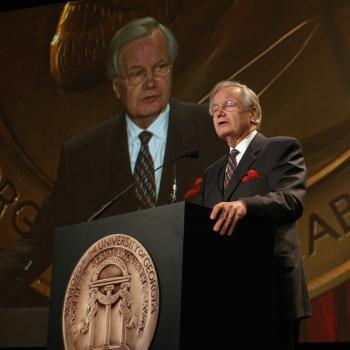
Protestants Observe Reformation Day on Oct. 31
Change has been a fact of life in the Christian church since its founding 2,000 years ago. You don’t need a college degree in church history to know that sweeping changes in Christianity have occurred like clockwork every 500 or so years since Christ laid the groundwork for his new religion in the first century.
The first seismic change in the church took place around 500 A.D., when the Roman empire collapsed and the Dark Ages began. There were immediate disruptions in trade and commerce, as the many miles of Roman roads fell into disrepair.
Germanic barbarians began to invade European cities, and a succession of kingdoms quickly gained and lost power. Additionally, the church began to compete with paganism for people’s souls, and the church gained ground.
Some 500 years after the fall of Rome — in about 1,000 A.D. — Christianity experienced its second major change when it split into eastern and western churches. About 500 years following that split, the western or Catholic church split, and the Protestant faith was born.
“Cleaning House”
As many Protestants observe Reformation Day on Tuesday, Oct. 31, let’s look at the state of Christianity in today’s world and consider the possibility that the church is experiencing yet another major upheaval.
The late author and religious scholar Phyllis Tickle compared Christianity’s periodic upheavals to cleaning house in her book, The 500-Year Rummage Sale. It’s a good analogy and a great title.
Tickle pointed out that historically, the Christian church “cleans house” every 500 years or so and decides what to throw out and what to keep. Thus, the idea of a rummage sale comes to mind.
Pondering the Future
As I thought about Reformation Day, the 500-year timeline and the state of the church today, I accepted something that has been nagging at me for a while: We are in the midst of yet another upheaval and can expect more sweeping changes in Christianity in the foreseeable future.
The idea wasn’t original to me, of course. Numerous religious scholars had beaten me to the realization by a number of years.
Recalling the Past
In her book, Tickle said Christ’s earthly ministry was the first gigantic “rummage sale.” She called this period “The Great Transformation” because Jesus transformed the way we understand our relationship with God.
Tickle’s second “rummage sale” took place when the Roman empire fell and the Dark Ages began around 500 A.D. During this period, monks and nuns preserved the faith. Then about 500 years later — in 1054, in fact — Christianity held yet another “rummage sale” when it split into the Eastern Orthodox and Roman Catholic churches.
Christianity’s next “rummage sale,” or seismic change, took place 500 years after the eastern-western split. At that time – which was the 1500s — the Catholic church splintered, and the Protestant tradition was born.
With each so-called rummage sale, Tickle said that Christians gained new and different perspectives about God and created new practices in their faith.
Sweeping Changes in the World
In the 21st century, Christianity is undergoing yet another seismic change because our world is turning upside down. Think about the revolutions in science, medicine, communications and life in general during the 20th century. Then, consider how much the church has changed in the past 100 or so years.
The horse and buggy gave way to cars in the early 1900s, and our increasing knowledge of electronics opened a whole new world to us in the later part of the century.
Diseases that once were automatic death sentences became treatable thanks to advances in medicine. And diseases that turned people into invalids were either eradicated, such as polio can be through vaccination, or treated with medication, such as diabetes.
Satellites orbited the earth in increasing numbers, and telegraphs, landlines and “snail mail” gave way to the internet. Instant global communication revolutionized the way we live.
Sweeping Changes in Christianity
The church changed, as well. When I was a child living in a small southern town, nearly everyone attended church on Sunday mornings.
Many also attended services on Sunday and Wednesday nights. Most of us were Baptist, Methodist or Presbyterian, though one family in town was Catholic and another was Jewish.
Nearly all of us regularly attended our church or synagogue. Today, that isn’t the case. Church attendance and membership are declining in the U.S. and Europe, while the number of people who identify as “spiritual but not religious,” “none of the above,” agnostic or atheist is growing.
Denominations are much less important than they once were. Increasing numbers of small churches are closing regardless of their denomination, and non-denominational megachurches are becoming more prevalent.
Turning Away from Denominations
“Many of us are getting to the point we don’t identify solely as Protestants or centrally as Methodist or Presbyterian or Lutheran or whatever,” my pastor, the Rev. Amy Cook, told me recently. “There’s a coming together within the church where we identify as Christian. No more, no less.”
The ecumenical Institute on Religion and Democracy noted, “Non-denominationals are now the largest non-Catholic religious group in America. Nearly all denominations are declining…. Nearly all growing congregations are non-denominational.”
Many of the most successful congregations that have ties to a denomination now disguise those ties, the institute said. However, “Many if not most nondenominational churches are effectively Baptist in theology and polity, governed congregationally, through elders, and practicing believer’s baptism.”
The institute pointed out that mainline Protestant denominations “have been the pillars of American religion and for much of American civil society since the beginning of the republic. All successful movements and communities ultimately need multigenerational institutions to sustain and transmit their message.”
Yet, Protestant denominations that have “large bureaucracies, strong brand loyalty, famous leaders, and a self-sustaining subculture” are seen as less relevant in today’s world, according to the institute.
Predicting Changes
A number of Southern Baptist seminaries continue to remain strong and “will produce clergy for post-denominational America. And many denominations will survive on a much smaller scale, with very lean structure, and often deemphasizing their denominational brands.
“In their place, there will be growing congregationalism attenuated by informal church networks. Christians, individually and congregationally, will rely on online resources that are not specific to any denominational traditions.”
The institute predicted that while denominations will decline, the traditions that created them – such as Lutheranism, Anglicanism and Wesleyanism – will continue to exist and perhaps even thrive. (Read the institute’s article, “Post-Denominational America,” here.
Politicizing the Church
There also is a great divide between conservative and liberal churches. Many conservative churches and their members have aligned themselves with extreme right-wing politics and have become politically active in supporting candidates who oppose abortion and gay rights. (See my posts, “Should We Have Politics in America’s Pulpits?” here, and “Has the Christian Flag Become Too Politicized?” here.
Some pastors have even gone as far as endorsing specific candidates, despite risking their tax-free status by doing so. (See my post, “Should Politically Active Churches Lose Their Tax Exemption?” here.
Meanwhile, liberal and progressive churches remain disturbingly quiet.
Closing Thoughts
No one can predict the future, but we can look at trends and make guesses. My guesses are that:
- We will continue to see sweeping changes in Christianity for the foreseeable future.
- Christianity will survive.
- It will look and sound different than it does today.
- Megachurches will become more widespread.
- Online gatherings will become more prevalent.
- The church’s mission and focus on Christ as the Son of God will not change.













